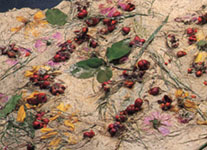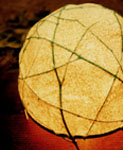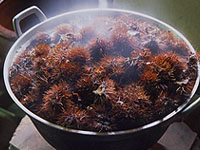
|
|
"The
third generation Tomi - a quiet artist" |
||
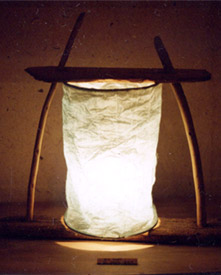 |
The frames of his lamp are like washed up logs, battered and bleached like bones, beaten by the fierce Japan Sea waves. The light passing through the plant fibers and the frames are soft, and the intensity becomes gentle and comfortable. It's gentle illumination coordinates well with today's modern interior. Another of his work, is a lampshade that assembles numerous irregular bamboo branches’ tips. It is a dome made of washi paper and bamboo. At first it looks very simply to make. But I was surprised as I listened to him explain each meticulous step that requires careful attention. Nowadays we do see many lighting fixtures made with washi paper and bamboo, but this lampshade is somewhat different. He utilizes the elasticity found in the very tip of bamboo trees. The approach to skillfully apply the elasticity of the bamboo to the lampshades is absolutely novel. Both lampshades are handmade works, which can only be made when the artist collects enough stock. He will not work with materials he is not satisfied with. Therefore, they are not suitable as sales item. However, they are exquisite pieces of work I would like to introduce to the public that cherishes a one of a kind original piece. |
|
|
How
are Kazuyuki's lampshades made? |
|
|
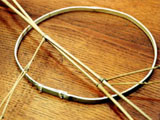 |
30-cm diameter frame made of bamboo | |
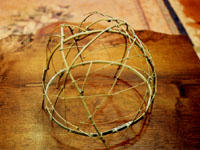 |
Calculating ample lengths of the bamboo to serve as the legs of the lamp, the bamboo strips are laid and tied piece by piece with Kozo fibers strips to form a dome. | |
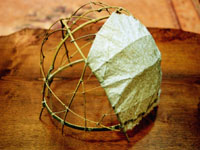 |
Washi paper, dyed gray (with boiled chestnut burs), are piece by piece glued on to the frame. | |
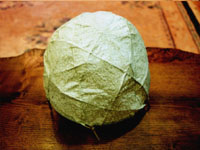 |
The finished dome. | |
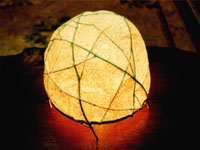 |
The soft colors of washi dome light. | |
|
The photographs were taken by the photographer, Katsuhiko, for the quarterly magazine "Ginka" vol. 84. They have been used here with the permission of the publisher and photographer. We are grateful for their kindness. |
||
|
|
